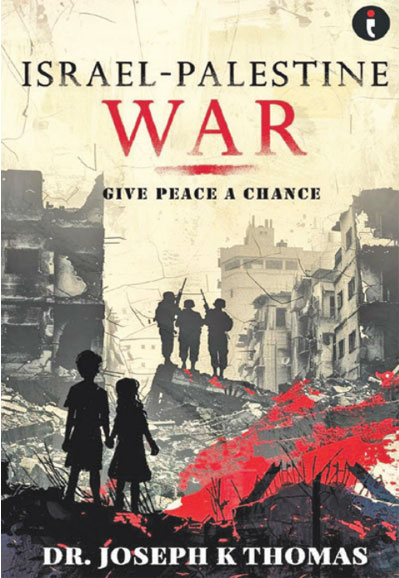Bold ideas and global effort can bring peace between Israel and Palestine. An extract
 Dr Joseph K Thomas
Dr Joseph K Thomas
A bi-national state would theoretically eliminate the division between Israel and Palestine altogether, creating a single nation, where citizens of both Jewish and Palestinian Arab descent could live side by side with equal rights and responsibilities. This idea challenges the very notion of separate states and proposes a radical rethinking of identity and nationhood.
Critics argue that such a framework could lead to the eradication of the Jewish character of Israel, while supporters suggest that it could be the ultimate expression of democracy in the region. Historically, there have been periods and places where Jews and Arabs lived together in relative harmony, offering a glimmer of what might be possible.
Evidence of successful bi-national or multi-ethnic states can be seen in countries like Belgium or Canada, although the complexities of the Israeli-Palestinian context are admittedly unique. Testimonials from individuals living in mixed cities within Israel could provide valuable insights into the challenges and opportunities of such cohabitation.
On a practical level, implementing a bi-national state would require profound constitutional changes, guarantees of minority rights, and perhaps a new flag and national anthem that represent the diversity of the single state.
Regional Integration
Looking beyond the immediate geography, regional integration suggests that peace might be achieved by integrating Israel and Palestine into a larger Middle Eastern framework. This could involve economic unions, defense pacts, and political agreements with neighboring Arab States.
Models of regional integration can be found in the successes of ASEAN in Southeast Asia and the aforementioned European Union. These alliances have not only fostered economic growth but have also significantly reduced the likelihood of conflict among member states.
The Abraham Accords have shown that there is a willingness among some Arab nations to engage with Israel, which could serve as a stepping stone toward broader regional cooperation. The practical applications of this could include collective security arrangements and regional infrastructure projects that benefit all parties.
Economic Cooperation Frameworks
Economic cooperation frameworks put forth the idea that peace can be built through shared prosperity. By creating joint economic zones, industrial parks, and collaborative business ventures, Israelis and Palestinians could become economically interdependent, which in turn could foster peaceful relations.
Evidence of such frameworks can be seen in the cross-border industrial zones between Turkey and Bulgaria, which have helped to stabilize a once-tense relationship. Testimonials from businesses operating in these zones often highlight the mutual benefits that come from economic collaboration.
Practical applications could include shared technology parks in fields like cyber security or water conservation, where Israelis and Palestinians are global leaders. Such cooperation could lead to job creation and economic growth, which might lay the groundwork for a sustainable peace.
Technological and Environmental Peacebuilding
Lastly, peace could be fostered through joint technological and environmental initiatives. The region faces significant environmental challenges, including water scarcity and desertification, which do not respect political borders. By working together on these issues, Israelis and Palestinians could build trust and cooperation.
These are many examples of environmental peacebuilding around the world, such as the transboundary conservation areas in Southern Africa, which have united former adversaries in the pursuit of ecological preservation. Testimonials from environmental NGOs in the Middle East highlight the potential for cooperation on issues like water management and renewable energy.
On a practical level, this could involve joint research and development projects, shared desalination plants, or cooperative efforts to develop the Dead Sea region in a sustainable manner.
As we navigate between these points of discussion, the questions arise: Can we dare to envision an Israeli and Palestinian society that thrives on the bedrock of unconventional but pragmatic solutions? Can the olive branch of innovation be robust enough to support the weight of decades of conflict? The path to peace is often winding and fraught with uncertainty, but the journey must continue with bold ideas that challenge the status quo. Each of these alternative proposals offers a vision of what might be a future where the cacophony of conflict gives way to a symphony of collaboration and coexistence.
ISRAEL-PALESTINE WAR: GIVE PEACE A CHANCE
Dr Joseph K Thomas
Indie Press, Pg 215, Rs 399

